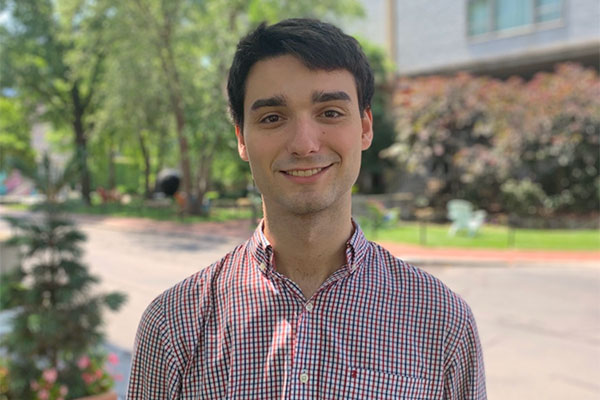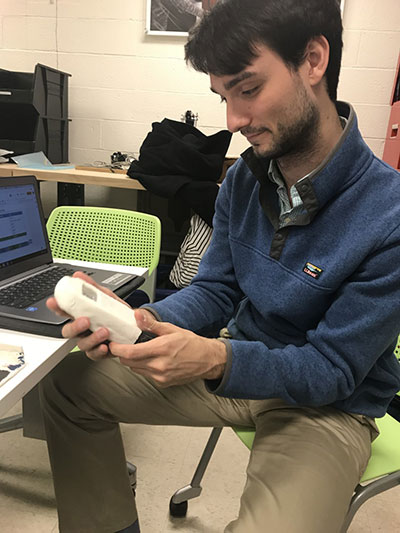PlusOne to Help Give Back through the Lens of Science and Healthcare

For Michael Parrish, pursuing a degree beyond the undergraduate level was always in the cards. “I declared bioengineering from day one at Northeastern University,” Parrish admits. “But I initially was interested in exploring going to medical school and being in a more patient-oriented career.” His well-rounded Northeastern experience helped Parrish, who graduated with a BS in Bioengineering in May 2020 and an MS in Bioengineering in December 2020, chart his path toward his career aspirations.
Parrish states that he always has had a passion for “giving back to the community through the lens of science and healthcare.” Through positive experiences with the College of Engineering faculty in diverse research areas, Parrish was able to figure out that his interests fit more with working on the tools healthcare professionals use to treat patients every day. For example, in the summer of 2019 Parrish joined the Laboratory for Advanced and Multifunctional Polymeric (LAMP) Biomaterials Lab or the Bencherif Laboratory, and that fall he was selected as a recipient of a PEAK Ascent Award to support the research he was conducting under Assistant Professor Sidi A. Bencherif, chemical engineering, and his direct mentor, PhD student Zach Rogers.
From there, Parrish began seriously considering the PlusOne program that he would go on to participate in.
“A big goal of mine was to find a high-impact position as part of a small team at a startup, right out of college,” Parrish shares. “For the mechanical design side of bioengineering, I saw an MS degree as a better path for achieving my career goals than another type of higher education degree. And the PlusOne program made this a much more accessible option for me.”
“The PlusOne program is an incredible opportunity for anyone interested in continuing their education, as it gives the flexibility to pursue advanced coursework at the undergraduate level, maximizing your time while at Northeastern University,” he says, adding that he really enjoyed getting to take the course options that he was passionate about earlier in the curriculum.
In the classroom, Parrish was quick to state that professors, both undergraduate and graduate, were always able to keep lessons engaging in unique ways. Having pursued a concentration in Biomedical Devices and Bioimaging, Parrish highlights how the classes he took looked holistically at medical device design, with attention to real-world applications. One such class was about the FDA and design and manufacturing of medical devices, in which Parrish explains that “we had a semester-long group project scoping out a hypothetical medical device and then going through all the design requirements that would go into an FDA submission.” In another class on the design of implants, Parrish mentions that the professor utilized his many connections in the biotechnology and healthcare industries to have guest speakers come in most weeks to talk about their own research and expertise.
Parrish also mentions several opportunities that led him to grow in ways beyond the classroom. He joined the Biomedical Engineering Society in his freshman year and attended consistently, looking to get involved with an activity that overlapped with his interests. “At the end of my first semester, I attended elections as a pretty timid freshman, without intending on running for a position, but all my friends encouraged me to do so and over the years, we all ended up on the executive board of the club. I gained a lot of confidence I wouldn’t have found on my own.”

As part of the Enabling Engineering student organization, Michael Parrish, E’20, ME’20, bioengineering, test fits a silicone molded cover prototype to fit to a client’s power wheelchair joystick / control panel as part of a project to create a waterproof device.
Parrish also highlights a unique experience volunteering with the Boston Brakers, a local power wheelchair soccer team, that came about through a service-learning course offering. He found that he enjoyed meeting new people in the community, fostering relationships with the team, and learning through volunteer opportunities beyond the traditional classroom environment. In addition, he participated in the Enabling Engineering student club in the fall of 2019. He worked on a project for a client seeking a waterproof device to use with his power wheelchair to protect it from moisture if it rains.
In closing, Parrish emphasizes how appreciative to Northeastern University he is for the opportunities he had during his time as a student. “Success starts with knowing what your goals are for yourself, both short term and long term,” Parrish says. “Northeastern really let me know what was out there in the world of STEM, and helped me figure out how I wanted to best contribute to that.”